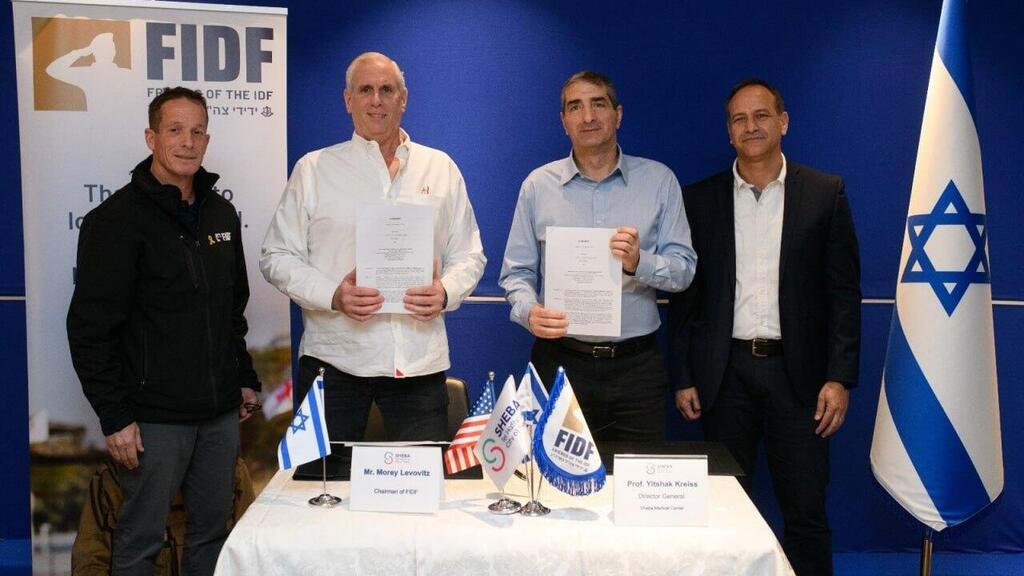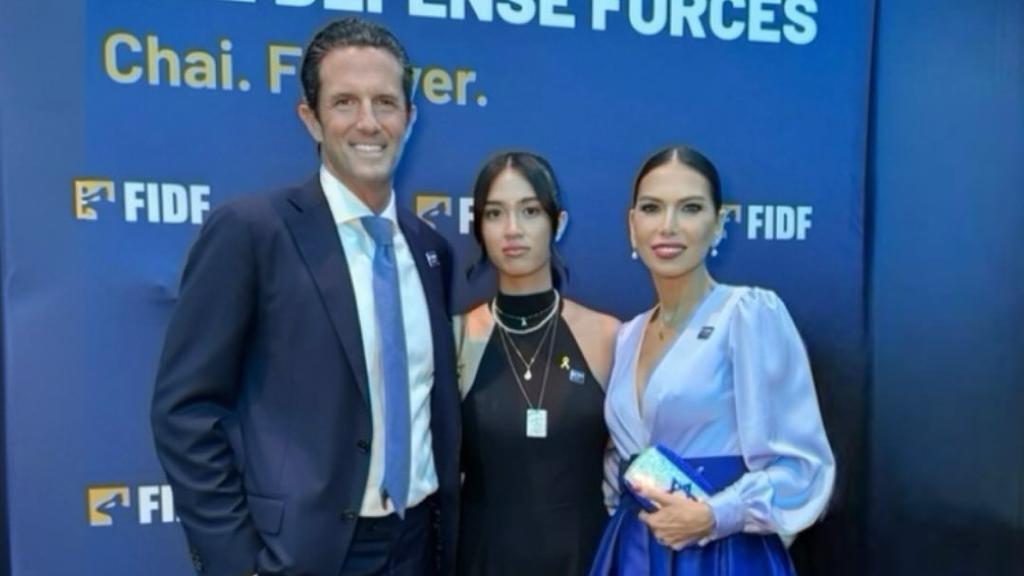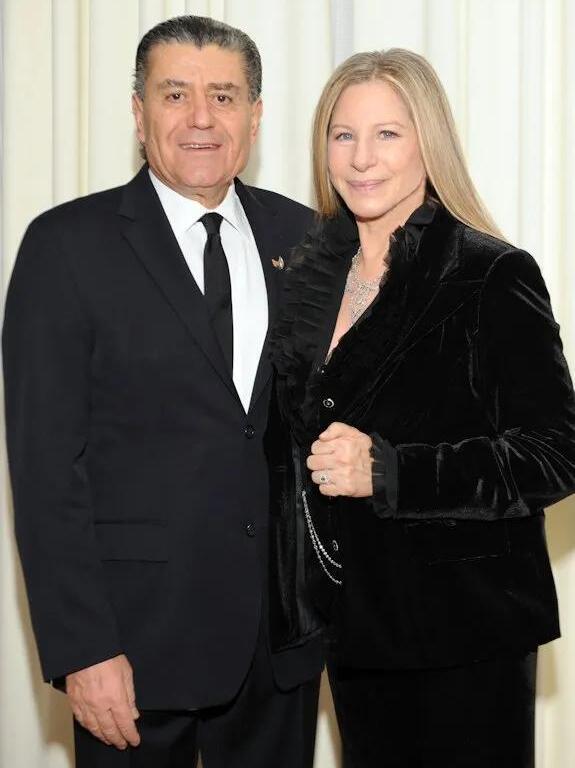The Friends of the Israel Defense Forces (FIDF), a major driver of financial support for IDF soldiers, is approaching the end of one of the most tumultuous episodes in its history.
Ynet has learned that following an emergency board meeting Wednesday night, members agreed to end the tenure of board chair Morey Levovitz. Negotiations are now underway to craft a joint separation agreement, though insiders say they “showed Morey the door.”
4 View gallery


The tenure of FIDF board chair Morey Levovitz is coming to an end
(Photo: from social medai)
Prime Minister's confidant Nili Falik is expected to return to the position of chairman, and a significant portion of the powers of CEO Steve Weil, a close associate of Levovitz, will be transferred to Maj. Gen. (res.) Nadav Padan, while Weil’s salary and benefits will be notably reduced. “An era has ended,” one informed source told Ynet. “The way things were is no longer tenable. It’s clear the organization can’t continue like this.”
The decisive vote came after two weeks of internal conflict and behind-the-scenes lobbying by major donors. Both Levovitz’s supporters and opponents conducted telephone campaigns to sway votes. “It’s not just about Morey anymore,” one senior figure urged. “This is about the future of the organization.”
Former Hamas hostage Noa Argamani tells her story to FIDF audience
Since the Ynet publication, FIDF leadership has launched a major response campaign, hiring a crisis PR firm and instructing staff with clear guidelines: “Do not talk to journalists, do not share information with external parties.” Donors have been sent reassurance letters stating that “there’s no reason to panic” and that “the issue is being handled.”
In an official letter, Padan wrote: “In response to recent media coverage that some of you may have seen, we want to take this opportunity to reaffirm FIDF’s steadfast commitment to you—our supporters … . Together, we are making an immeasurable difference. And as our soldiers continue to put their lives on the line every single day, it is essential that we continue to serve them with the same sense of urgency and responsibility.”
Padan emphasized: “Since the beginning of war, FIDF has responded to the IDF and MOD’s requests for additional wartime well-being support and committed $250 million in emergency campaign funds. 100% funds raised for the Emergency Well-Being Campaign are being sent to Israel with no overhead being taken." He added that the group's transparency ratings are among the highest in the U.S.
But on the ground, donor pressure continues to mount. Longstanding donors have canceled event attendance, frozen pledges, and threatened to boycott high-profile occasions. For example, the annual golf fundraiser—which typically raises around $500,000—opened this year with only 50 participants instead of 150, and is now projected to operate at a loss. An internal directorate email warned of a possible 50% drop in donations, a 35% increase in overhead costs, and significant risk to the New York gala—one of the organization’s main revenue sources.
Data found in internal correspondence shows that donation postponements have already exceeded $10 million. Donors are reassessing administrative expense ratios versus funding allocated directly to soldier projects. “This crisis will directly harm our ability to fund projects for the soldiers,” one senior official warned. Another major donor reportedly messaged Levovitz: “"I hold you directly responsible for this crisis. You should be ashamed and resign immediately. You’ve done irreparable harm to our brand. You’re harming the soldiers.” A veteran supporter warned: “The situation is catastrophic and could impact the New York gala. Without a clear response, donor trust will be irreversibly damaged.”
Amid financial concerns, fresh allegations against management have surfaced and are now being revealed for the first time. A complaint filed with New York’s Human Rights Commission by former fundraising VP Shea Lerner accuses FIDF of wrongful dismissal in retaliation for his raising concerns about discrimination and CEO Weil’s misconduct.
4 View gallery


Signing ceremony to sign an agreement to establish a national system for post-traumatic stress disorder treatment for IDF soldiers
(Photo: Ori Shemesh/FIDF)
The complaint claims Weil held business meetings in "cigar clubs" attended almost exclusively by men, made sexist remarks, and invited female executives to “unprofessional” settings—including proposing meetings with cigars and whiskey for a branch president. One quote in the complaint allegedly records Weil asking Lerner: “Which female employee would you prefer to invite to dinner—the Miami girl or the Washington one?”
According to the complaint, Lerner reportedly alerted HR and senior leadership repeatedly and warned of legal repercussions. Months later—and allegedly as retaliation tied to recruiting a high-level female hire and her salary—he was dismissed in a terse phone call. He says this was contrary to organizational policy; The official reason was an excess of authority, but the real motive, according to Lerner, was revenge for alerting the CEO's conduct. The case ended in a confidential settlement.
When Ynet asked whether donor funds were used in the legal settlement or disciplinary action had been taken, FIDF responded: "It is unfortunate that you have taken partial bits of information fed to you by people with selfish agendas –disgruntled former employees for instance—who have misled Ynet and other members of the media to paint a picture of FIDF that is simply not true."
"This summer, we brought 242 bereaved children to camp in the U.S. as part of a $28 million program; we invested over $117 million in post-trauma treatment for soldiers and their families; $40 million in life-saving medical equipment; and committed $250 million in soldier aid.” The organization insisted fundraising remains strong because backers “understand the critical and vital role FIDF plays,” and claimed continued “professional and public leadership focused on implementing these meaningful programs.”
Ynet asked FIDF whether donation funds were used for the legal settlement and whether steps were taken following the allegations. In response, it said: "It is unfortunate that you took pieces of information that were given to you by people with selfish agendas – for example, disgruntled former employees – who misled Ynet and other media outlets to paint a picture of FIDF that is not entirely true.
"This summer we have brought 242 bereaved children of fallen soldiers to the United States for a camp program to help their healing, one piece of a $28 million program for bereaved families. FIDF has invested more than $117 million to help soldiers and their families with PTSD support, $40 million for lifesaving medical supplies to soldiers and have committed to an overall funding package in excess of $250 million to help the brave men and women of the IDF and their families who are defending Israel and Klal Yisroel. Our fundraising remains strong because supporters understand the critical and essential role FIDF plays. Our professional and lay leadership remain focused on executing these programs and services that are actually helping Israel and the broader Jewish community.”
Another issue resurfaced involving Israeli travel agency Ortra, flagged in the internal investigation as a deviation from the standard tender process and linked to someone close to Levovitz. The leaked report described the service as more expensive and less professional than alternatives. In a donor video briefing, Weil defended Levovitz: “He is a person of unimpeachable integrity and honesty. He did not receive any benefit. He recommended a company that offered transparency and detailed pricing. He shared information—he didn’t impose, didn’t benefit personally—there was no coercion.” But staff claims to the contrary suggest Levovitz insisted on exclusive use of Ortra and penalized a regional manager who tried to use another service.
The central question now is what becomes of FIDF’s essential programs in Israel? As an official partner of the IDF, the Israel Soldier’s Association, and Israel’s Ministry of Defense, FIDF disburses hundreds of millions annually to fund housing for lone soldiers, post-trauma treatment, health centers and support for bereaved families. Official statements from the Defense Ministry, IDF Spokesperson’s Office and Soldiers’ Association express calm and gratitude for FIDF’s historic contributions—especially during the Iron Swords War. Nonetheless, project insiders tell Ynet there is “quiet concern” about the crisis’s potential impact on future funding.
The Defense Ministry told Ynet that it "appreciates the important activities of FIDF and its unprecedented contribution to the welfare of IDF soldiers over the years, especially during the Iron Sword War. We work in full cooperation and thank American Jewry for its mobilization for the sake of IDF soldiers and wounded." An IDF spokesperson declined to comment, and the Soldier's Welfare Association also said that it "does not deal with the organization's internal affairs but appreciates the long-standing activities of FIDF and the generosity of its donors for the welfare of IDF soldiers."
However, in conversations with officials involved in the projects, Ynet was told that there is "quiet concern" about the implications of the crisis on the flow of funds.
The current move aims to stabilize operations by curtailing the influence of the chair and reducing the CEO’s powers. The lingering question: Will these changes be sufficient to restore donor trust, or will this crisis leave FIDF weakened and divided—ironically at a moment when Israeli soldiers need it most?





